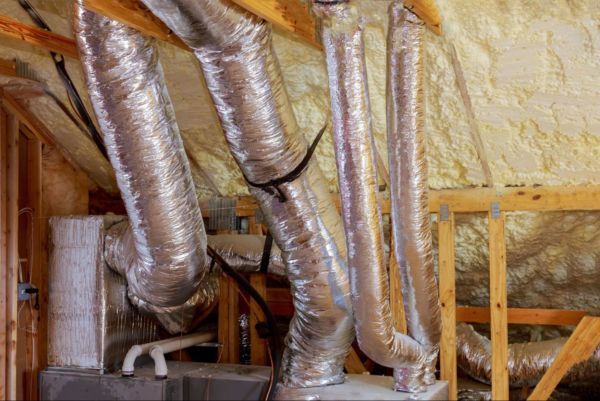Understanding Insulation R-Values for Florida Homes
June 18, 2025

Having good insulation keeps your home comfortable and your energy bills in check. If your home struggles to stay cool or your AC works harder than it should, your insulation may not be doing its job. Understanding insulation R-values helps you make better choices that impact your comfort, efficiency, and energy costs.
Advanced Air has served Florida homeowners since 1989, offering honest recommendations, expert installations, and no-surprise pricing. We help when you want to upgrade or solve a comfort issue, simplifying service with fast, convenient scheduling. Our skilled team gets your system back to peak performance, often within 24 hours. But we also know the best systems can falter when insulation fails to protect your home. Learn all about insulation R-values, including:
- What does R-value mean in insulation?
- Why R-value matters for Florida homes
- Common R-values and where to use them
- Factors that affect insulation performance
- How Advanced Air can help improve your home's energy efficiency
Explore how insulation R-values impact heating and cooling performance and what you can do to maximize your investment.
Want Better Energy Efficiency? Let’s Talk Ducts.
Sealing leaky ducts helps your AC system work smarter, not harder. Combining quality insulation with good ductwork improves airflow, reduces energy costs, and ensures consistent comfort. Contact Advanced Air today to get a free duct sealing estimate.
What Does R-Value Mean in Insulation?
R-value measures how well insulation resists heat transfer. Higher numbers reflect better heat resistance than lower numbers. When you ask, "What is an R-value of insulation?" you're really asking about the insulation's effectiveness. Determined by thickness per inch, insulation with an R-value of R-19 performs better than an R-13 of the same material.
R-values are also cumulative, so layering insulation increases the total heat resistance. This design makes adding new insulation over the old an effective way to improve energy efficiency. Of course, numbers only tell part of the story. Proper installation, material type, and environmental conditions also impact performance.
Why R-Value Matters for Florida Homes
Florida may not see snow, but insulation plays a significant role in year-round comfort. Instead of holding heat, our insulation must keep outdoor heat and humidity out while keeping cool air inside. R-value affects:
- How easily your home heats up during the day
- How well your AC keeps up with the heat
- How consistent indoor temperatures stay
Florida's long cooling season, temperature swings, and high humidity increase the strain on your HVAC system. However, choosing the correct insulation helps reduce that strain, even without super-high R-values.
Common R-Values and Where to Use Them
The U.S. Department of Energy recommends the following R-value chart for homes in southern states like Florida:
- Attics: R-30 to R-49
- Exterior walls: R-13 to R-15
- Floors: R-13 to R-19
Homes built before modern energy codes, especially those from the 1970s or earlier, may be under-insulated. This problem is particularly common in attic spaces, where poor insulation can drastically reduce efficiency.
Factors That Affect Insulation Performance
Two homes can have the same insulation R-values and experience different indoor climates. This difference occurs due to variables that impact real-world performance. These include:
- Compression. Insulation crammed into tighter spaces loses its effectiveness. Prevent this by choosing insulation materials designed for compact spaces and using professional installation.
- Moisture. Insulation exposed to water due to humidity, roof leaks, or poor ventilation loses thermal resistance. Fixing leaks, improving attic ventilation, and adding vapor barriers can protect against moisture damage.
- Air leaks. Warm air undermines insulation by sneaking through gaps around windows, doors, and unsealed ductwork. Sealing leaks with caulk, weatherstripping, or professional duct sealing promotes better performance.
Pairing insulation with sealing and ventilation upgrades improves efficiency. Advanced Air recommends sealing ducts, correcting attic ventilation issues, and improving insulation to optimize energy savings.
How Advanced Air Can Help Improve Your Home’s Energy Efficiency
Several factors impact home energy efficiency. Our technicians look at the whole picture — especially your ductwork, attic condition, and airflow — evaluating your setup and identifying areas where sealing, ventilation, or system upgrades can improve performance. Our services include:
- Comprehensive duct inspections
- Aeroseal duct sealing
- Attic ventilation solutions
- Cooling system integration
We've earned thousands of 5-star reviews by being thorough, transparent, and professional. Our 100% satisfaction guarantee means you never have to second-guess your decision to use Advanced Air.
Cool Smarter — Book Your Free Home Evaluation
Take control of your comfort and energy use with a free home evaluation from Advanced Air. Let our team assess your insulation and ductwork to keep your home cozy when Florida temperatures rise.
- Posted in:
- Air Conditioning

